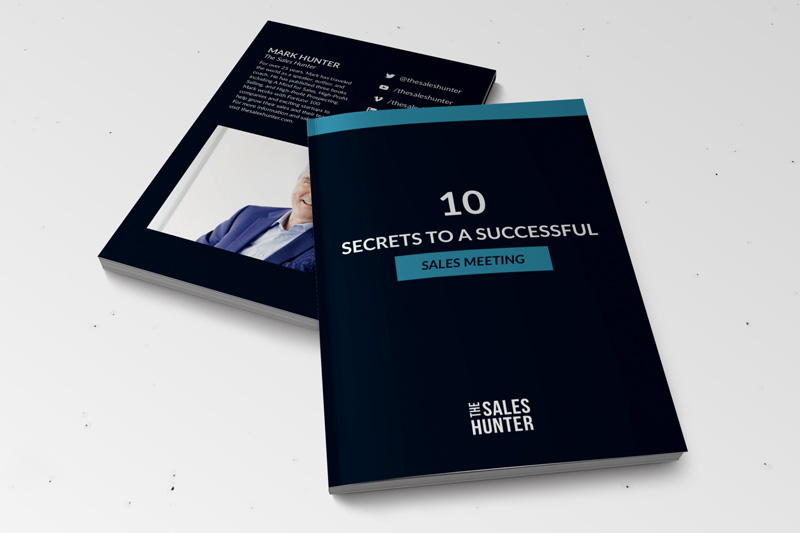This week, I’m talking about how to have an effective demo call. I put out a new blog post and video like this every week, so I want you to hit subscribe. That way, you never miss a sales tip. I’m here to help you be successful.
That said, let’s talk in detail about how to have an effective demo call. I’ve broken it down into ten things you can do to get better results.
Video – How to Have an Effective Demo Call
1. Clear Outcomes
Make sure the customer is clear as to what the outcomes are at the end of the demo call. That means you have to be clear.
If you need to have a second demo call, then have a second demo call.
I commonly find salespeople going, “Well I’m just going to see where this goes.” No. I want you to have clear expectations because it’s going to help you stay focused.
2. Repeat the Discovery Call Learning
Repeat all of the learning from the discovery. This point is key for a couple of reasons.
To start, I hear all the time from customers that nothing irritates them more than when salespeople say, “Oh, well, I already shared that with the person during the discovery call and I just need to verify this information.”
If you cannot play back to the customer key insights that they shared with you during the discovery call, you are discounting the entire selling process.
One of the things I say is to start the call by saying, “Hey, during the discovery call, these were a couple of things that you shared with me. I want to come back and build on those.” That makes the customer feel good.
3. Control the Agenda
Do not allow the customer to say, “Hey, could you show me this and that?” What’s going to happen is you are going to wind up chasing shiny objects. You might be thinking, “Yeah, but Mark, that’s where the customer wants to go.”
Yes, but you know the product better than they do. If this proves to be an issue, say, “We’ll set up a separate demo call for this.”
For instance, I tell people who sell SAS, “You are focused on what the product does, not the administration process behind the scenes.”
Often times, you are selling it to the user of the software. If you spend all your time talking about administrative items, their eyes are going to glaze over and they’re not going to buy.
Save that for a separate demo call when they are ready to make the buy, and you are dealing with people who are going to be on their installation team. Control the agenda.
4. Know the Customer’s Needs
To know this, you must be asking, “What are the needs?”, “What are the outcomes?” and “Why are they talking to you?”
If you cannot be succinct in understanding what their needs are, then why are you talking to them? Why are they talking to you?
That means something failed up to that point in time. The discovery call failed. This is not the time to be finding out the needs of the customer.
You can refine your needs and you can add to the needs, but the framework of their needs must have been discovered before you get to the demo.
5. Know Your Objectives
Knowing your objectives comes back to clear outcomes. This is where you intend to have the customer at the end of the call.
This is what is going to be the next step. This is what you anticipate are going to be the follow-up items. These are going to be the steps that you’re going to be able to do or you’re going to want to do in order to close the sale. Be very clear on that.
6. Less is More
Yes, less is more. Do not think for a moment that you need to show every element; that just glazes people’s eyes over. I do not care how much people want to see everything, because when I find people that say, “I want to see every element,” I know that what they are doing is window shopping.
All they are doing is window shopping. They are just looking to find out information that they plan to use someplace else. They are not really interested.
Less is more. In a demo, I want to make the demo a ‘second piece.’ The primary piece is the conversation. The demo is really just the icing on the cake.
7. Stay Focused
Do not allow the customer to take you down side paths with questions like, “So what happens if I do this?” and “What happens now?” You may be very willing to have those conversations, and if that is part of the demo process, that’s fine.
That said, do not stray from the beaten path. If you do, it’s going to get you in trouble as the customer keeps asking questions and you run out of answers. You do not want to find yourself saying, “Oh, I don’t quite know that.”
If they raise several questions, say “Great, let’s set up a future time to talk about this. I’ll get another person involved and we will have a conversation on that.”
8. Engaging Questions
You have to be asking engaging questions. “Do you have any questions?” or “So does that make sense?” and even “Do you like it so far?” do not count as engaging questions, yet those tend to be the primary questions that I hear people asking during demos. It drives me nuts.
A few examples of engaging questions you could work into your demo include:
- “How would you see this in the daily process of your company?”
- “How would you see this changing what your people are doing now?”
Engage your customer with intentional questions.
9. No Show and Tell
Show and Tell is something you did in elementary school but it is not something you do as an adult. It’s embarrassing I even have to talk about this, but I do.
I see too many sales where the demo is being led by a technical person who has no clue about sales. You can have a technical person on the call but you cannot have them leading the demo. Do not allow them to drive. If you do, you are going to wind up in a Show and Tell situation.
You, the salesperson, must be in charge.
10. Questions
My last point is a repeat of some of the points I have brought up, but I want to reiterate the importance of questions.
You always have to be asking questions which take you to a very clear call to action (CTA). You have to be very clear as to what the CTA is.
When you finish up the demo, do not leave the customer hanging. If you leave them hanging, you’re in trouble. If you leave them hanging, you’re going to wonder why the deal does not close. You need to be very clear and very persistent.
I do hope these ten ways I have outlined here help you in your next demo call. Let me know in the comments below what you intend to work on!
Grab A Mind for Sales and subscribe to my blog so you get these Sales Tips delivered straight to your inbox every Wednesday morning and never miss out on a chance to improve.
Check out The Sales Hunter University, too, if you’re interested in unlimited personal growth, hands-on learning, quick tips, abundant resources, and an amazing community.
Great selling!
Copyright 2021, Mark Hunter “The Sales Hunter” Sales Motivation Blog. Mark Hunter is the author of A Mind for Sales and High-Profit Prospecting: Powerful Strategies to Find the Best Leads and Drive Breakthrough Sales Results.
linkedinyoutubetwitterfacebookinstagrampinterest











